 Leading Blog | Posts by Category |
 Leading Blog | Posts by Category |
07.04.22

The Improbable Achievement That Was the American Revolution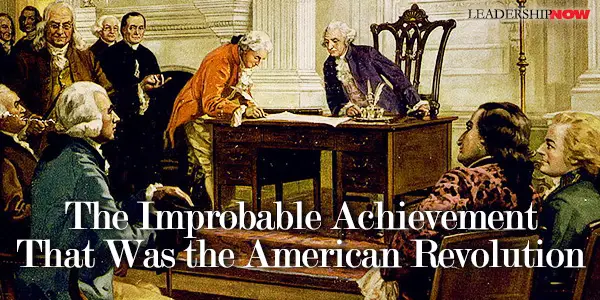
AMERICAN writer and pamphleteer Thomas Paine believed that it was common sense that an island could not rule a continent. “No event in American history which seemed so improbable at the time has seemed so inevitable in retrospect as the American Revolution,” writes Joseph Ellis in Founding Brothers. He adds: The creation of a separate American nation occurred suddenly rather than gradually, in revolutionary rather than evolutionary fashion, the decisive events that shaped the political ideas and institutions of the emerging state all taking place with dynamic intensity during the last quarter of the eighteenth century. No one present at the start knew how it would turn out in the end. It is easily assumed that all of the citizens of the American colony were on the same page. How else could it have worked? “The very term ‘American Revolution’ propagates a wholly fictional sense of national coherence not present in the moment.” It is only in hindsight that we assume the outcome. It is ironic that the very thing they were fighting against was an element in the nation they were trying to create. The key insight shared by most of the vanguard members of the revolutionary generation, is that the very arguments used to justify succession from the British Empire also undermined the legitimacy of any national government capable of overseeing such a far-flung population, or establishing uniform laws that knotted together the thirteen sovereign states and three or four distinct geographic and economic regions. The creation of the United States was a daunting task, to say the least. The United States is the world’s oldest enduring republic because “in 1787 a tiny minority of prominent political leaders from several key states conspired to draft and then ratify a document designed to accommodate republican principles to national scale.” The core principle being personal liberty and, therefore, personal responsibility. It may be easy to criticize what they accomplished almost 250 years later, but we would be wise to remember the words of historians Will and Ariel Durant, “No one man, however brilliant or well-informed, can come in one lifetime to such fullness of understanding as to safely judge and dismiss the customs or institutions of his society, for these are the wisdom of generations after centuries of experiment in the laboratory of history.” The checks and balances that permitted the infant American republic to endure were not primarily legal, constitutional, or institutional, but intensely personal, rooted in the dynamic interaction of leaders with quite different visions and values. What made it work was trust in the intentions of the other person. Their differences provided checks on each other. Character mattered because the fate of the American experiment with republican government still required virtuous leaders to survive. Eventually, the United States might develop into a nation of laws and established institutions capable of surviving corrupt or incompetent public officials. But it was not there yet. It still required honorable and virtuous leaders to endure. What happened in Philadelphia was truly a miracle. And on July 4th, we can be grateful that they, through all of the uncertainty, made it happen. 
Posted by Michael McKinney at 10:12 AM
06.03.22

“My Band-Aid is Better Than Yours!”
TODAY, far too many leaders are arguing over Band-Aids. They see problems and react with Band-Aids. All around us, we see the result of Band-Aids. Most of the contentious issues of the day are over band-aids. “My Band-Aid is better than yours!” It feels like we’re doing something, but in reality, we’re just putting a Band-Aid on the symptom. Band-Aids are a reaction, not a preventative. Band-Aids are meant to cover a problem with the assumption that there is healing taking place underneath. But as we have seen historically, that just doesn’t happen. We cover it up and walk away, leaving the real issues to fester and grow. Band-Aids cause us to miss the deeper dscussions we need to be having. Band-Aids answer the wrong questions. For too many decades, we have been applying Band-Aids without doing anything to heal the issue. Most rules and laws are just Band-Aids. Most noticeably and pervasively, in the 1960s, we began to look the other way. And now we have nightmares. We are reaping the consequences of that decision. We have a character problem. We have a values problem. It’s character that we need to be addressing. And character issues are first dealt with in the home. And that includes the use of rules. But foundational rules that guide behavior in the right direction. Not a codebook of rule upon rule—Band-Aids to fix what’s not happening in the first place. Fundamentally, character development is a parenting issue. By coddling generations of youth, even well-intentioned coddling, we have set them and society up for failure. Coddling makes people think that the problems are “out there” instead of “in-here”—inside all of us. Safe spaces only serve to deepen divides. Seeking out and understanding differences builds an appreciation of the positive intent of others. Our most vocal leaders in government, communities, and families raise their voices for Band-Aids because they either don’t know or do not have the courage to lead the hard choices that need to be made to address character issues. Taking the time to understand and deal with the underlying issues doesn’t stand a chance under the pressure to attenuate and appease the uninformed, loud, and reactionary voices. The problem is when you are working on character issues, it looks like you are doing nothing. Ironically, you are doing everything. Dealing with the real problem is not just time-consuming but painful. It means admitting that we’re wrong, that we’ve gotten off track. Band-Aids push the responsibility for a real solution off on someone else. When in reality, the solution is with each of us. But that’s hard. Sadly, we applaud people who march for Band-Aids and never deal with the issues. We need a different kind of march. March for being better people. March for inclusiveness. March for self-control. March for real-world relationships. March for civility. March for character. There’s something disingenuous about getting in someone’s face and screaming about controlling them. Love doesn’t make you do crazy things. Love forgives. Love is patient. Unchecked emotions may trigger compromising thoughts, but character keeps those thoughts in check. We created the world we live in both individually and as a society. If we don’t like it, it’s time to change who we are—not make more rules. More rules will not stop people who are inclined to disregard them anyway. It happens in families and organizations, but it has never been so obvious as it is in government. Instead of leading, they are reacting. It shouldn’t come as a surprise, I guess. As Maslow pointed out, if the only tool you have is a hammer, you treat everything as if it were a nail. If you are a lawmaker, you try to address every problem with a law. Even then, most laws are not designed to solve a problem but to push an agenda. We’re just kicking the can down the road. We need to stop arguing over Band-Aids and come together on the underlying character issues. We divide over Band-Aids instead of uniting over character. The values that molded the Greatest Generation, for example, have been slowly brushed aside for more superficial values. Character doesn’t just happen; it is forged. We have neglected our responsibilities in the faith that posting another law will solve the problem. Times like these provide us with the opportunity to rediscover our values—values we have forgotten. For now, what can we do? Start where we can do the most good. Start with ourselves. Start at home. We must discipline ourselves before we attempt to restrict others—self-regulation. We must order our own circumstances before we go to work on others. Perhaps we all need to put away the Band-Aids and focus on the source of the issue. Then we’ll find that we don’t need another rule.
Posted by Michael McKinney at 07:13 AM
11.02.20

Thoughts on the Presidency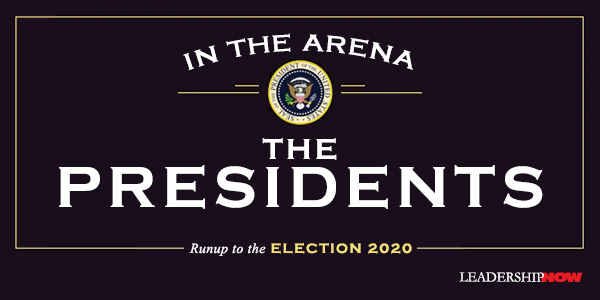
WITH the presidential election of 2020 upon us, here are some thoughts about the presidency: “Despite all of the trappings of power—the big house on Pennsylvania Avenue, Camp David, Air Force One, never having to sit in a traffic jam (ever!)—the president is in charge of an entity over which he has fairly limited power. This is, of course, exactly the way the Founding Fathers wanted it. And yet, try telling that to the American public or to the world when something goes really wrong. As we have seen, large-scale governmental failure becomes presidential failure, whether the president likes it or not.” — Elaine Kamarck, Why Presidents Fail “One can write endlessly about the differences between the first and twenty-first centuries A.D. But then as now, there is no greater attribute for a ruler than humility built on an accurate assessment of his own limits, from which the finest cunning emerges.” — Robert Kaplan, Warrior Politics “In selecting those who might occupy the most important office in this country—the Presidency—we put our potential leaders through a process that is both strange and brutal. The people who might make crucial decisions about war and peace, about our taxes, who will have enormous effect on the quality of our lives, our social order, the civility of our public discourse, undergo an experience from which few human beings could emerge whole. Some do not.” — Elizabeth Drew, The New Yorker, Running, November 23, 1975 “The President is, first of all, a manager.” — Peter Drucker, How to Make the Presidency Manageable, Fortune November 1974 “You can’t just appoint smart people.” You have to have a team and operate as a team, and any corporation would have a training program to acculturate people. — Newt Gingrich, 2011 “Blaming the bureaucracy is an easy way to gloss over the failures of government, yet running a government without the support of the bureaucracy is like running a train without an engine.” — Stephen Hess, Organizing the Presidency “No real-world human being brings to the U.S. presidency the range of attributes necessary for full success in the job”— James Fallows “Elections these days often seem more about who is to blame than who is to govern. New governments end up unpopular rapidly after their ascent to power, and very quickly the debate focuses on who or what is to be voted out rather than who is to be voted in. Voters are less inclined to see their selection as a long-term contract with a candidate or party and more likely to see it as resembling a transaction with a used car salesman.” — Tyler Cowen, The Complacent Class “In a democracy, someone who fails to get elected to office can always console himself with the thought that there was something not quite fair about it.” — Thucydides, History of the Peloponnesian War “The ruling power is always faced with the question, ‘In such and such circumstances, what would you do?’, whereas the opposition is not obliged to take responsibility or make any real decisions.” ― George Orwell
Posted by Michael McKinney at 07:29 AM
07.04.17

America Through the Eyes of the Founding Fathers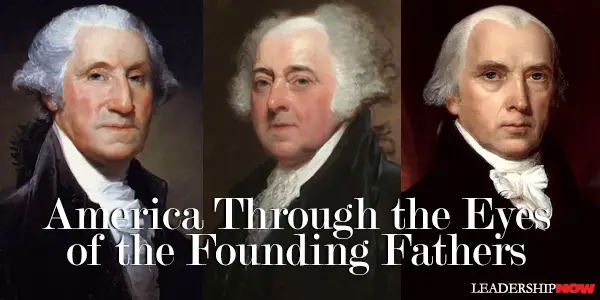
I But laws he believed, could not prevent this hypocrisy. No law, no constitution could save an immoral people. While the Founding Fathers believed in the necessary separation of Church and State, they believed no discussion of morals was possible without an agreed-upon philosophy – a philosophy that superseded the logic of men. So Adams concluded that “Our Constitution was made only for a moral and religious people.” George Washington also said as much halfway through his Farewell Address of 1796. He stated: “Of all the dispositions and habits which lead to political prosperity, Religion and morality are indispensable supports.” He added, “And let us with caution indulge the supposition that morality can be maintained without religion. Whatever may be conceded to the influence of refined education on minds of peculiar structure, reason and experience both forbid us to expect that National morality can prevail in exclusion of religious principle.” Both Adams and Washington are appealing to a morality that was eternal—beyond the customs of man. A morality that didn’t shift on convention. John Adams wrote to the Massachusetts Militia: While our country remains untainted with the principles and manners which are now producing desolation in so many parts of the world; while she continues sincere, and incapable of insidious and impious policy, we shall have the strongest reason to rejoice in the local destination assigned us by Providence. James Madison, the fourth President of the United States, believed that the governed were obliged to control itself. Furthermore, it was the responsibility of a virtuous people to select leaders that would reflect that ideal. Leaders that would be capable by virtue of their own character, to adapt these eternal morals that Adams often spoke of, to particular circumstances. Madison wrote: But I go on this great republican principle, that the people will have virtue and intelligence to select men of virtue and wisdom. Is there no virtue among us? If there be not, we are in a wretched situation. No theoretical checks--no form of government can render us secure. To suppose that any form of government will secure liberty or happiness without any virtue in the people, is a chimerical idea. If there be sufficient virtue and intelligence in the community, it will be exercised in the selection of these men. So that we do not depend on their virtue, or put confidence in our rulers, but in the people who are to choose them.
Posted by Michael McKinney at 12:47 AM
06.17.16

Why the Rules of the Entrepreneurial Game Are Changing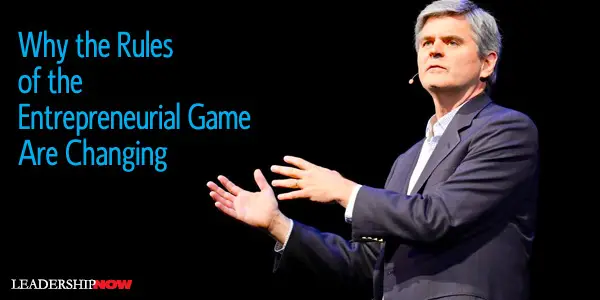
THERE WAS A TIME when AOL was how most Americans got online. Co-founded by Steve Case, American Online at its peak handled nearly half of U.S. Internet traffic and was the first Internet IPO. From his unique vantage point, Case shares his playbook for the future in The Third Wave. Case believes we are now entering the Third Wave of the Internet. The First Wave was building the Internet. The Second Wave was building on top of the Internet. And the Third Wave is integrating the Internet in seamless and pervasive ways throughout our lives.
Leading on the Third Wave of the Internet The Third Wave is about leveraging partnerships. Entrepreneurs of the Third Wave will spend a great deal of time focused on things other than tech as they work to connecting the Internet to everything else. It will be a matter of connecting ideas to create context. “The entrepreneurs of this era are going to challenge the biggest industries in the world, and those that most affect our daily lives. They will reimagine our healthcare system and retool our education system. They will create products and services that make our food safer and our commute to work easier. The Third Wave of the Internet will be defined not by the Internet of Things; it will be defined by the Internet of Everything. We are entering a new phase of technological evolution, a phase where the Internet will be fully integrated into every part of our lives… As the third wave gains momentum, every industry leader in every economic sector is at risk of being disrupted.” For example, education will be more personal, more individualized, and more data driven. “Education innovators were often too focused on technology in the First Wave, and too much on content in the Second Wave. The winners in the Third Wave will leverage technology and focus on great content, but also understand the importance of context and community.” Case believes that if you are to start a successful company in the Third Wave it’s going to come down to partnership, policy, and perseverance. Can You Work with Others? Your partnership skills may very well be the determining factor in the success or failure of your product. Partnerships help to bring credibility, momentum and a sense of inevitability. Can You Work with the Lawmakers? The government is a key force in the Third Wave. Third Wave entrepreneurs will need to figure out how to work with governments. “No matter how good an idea, a Third Wave company that lacks a clear strategy for policy is a dangerous gamble for investors. It is not that success is impossible, but the odds make it a difficult bet.” Are You Adaptable? Of course perseverance is critical in nearly everything of any importance. But Third Wave entrepreneurs will need to have a special kind of perseverance in a changing world to manage tensions. “The winners of the Third Wave will be those who chase big-impact ideas with a sense of urgency—but also methodically and diplomatically. It requires a fresh perspective and the ability to look a new paradigms without being burdened by legacy dogma.” He adds, “Third Wave entrepreneurs must find a way, then, to bring both viewpoints to bear—the nuanced perspective of the defending incumbent and the relentlessly disruptive mind-set of an entrepreneur on the attack.”
Case makes a distinction between “startups” and “small business” especially where policy is concerned. While startups are businesses that can scale quickly and disrupt an existing category, small businesses are focused on steady growth in the long term. More to the point: “The difference between the two is reflected both in the kinds of problems they are trying to solve and in their effect on the broader economy. Indeed, it is not small businesses but new business startups that account for nearly all of the net new job creation in the United States.” Collaboration is Key On a final note, Case reiterates: “Entrepreneurs as ‘Soloists’ will be replaced by orchestras playing a stronger, more credible tune. If you want to go far in the Third Wave, you must go together.” 
Posted by Michael McKinney at 06:49 PM
12.07.12

Do Leaders Really Matter?Are individual leaders truly responsible for the end result, or do they just happen to be there—for better or worse? asks Gautam Mukunda in Indispensible. To be sure, Lincoln and Churchill have mattered, but does every leader matter?Of course, every leader matters to someone. But here Mukunda is talking about leaders who matter on a larger scale—those that matter to all of us. What would have happened if someone else had filled the same role. “Leader impact can best be thought of as the marginal difference between what actually happened and what would have happened if the most likely alternative leader had come to power….Will he or she make significantly different choices than the other plausible candidates.” It gets down to how we choose our leaders and how we advance people through an organization. This process, Mukunda calls the Leader Filtration Process (LFP). A given LFP will filter candidates through a process designed to find those who conform to a specific value system—a Modal or standard leader. Occasionally an Extreme candidate will slip through. Many organizations weed out potential Extremes. The military’s promotion system is an example of a tight filtration process. At the other extreme, entrepreneurship is a very loose process—you become an entrepreneur just by deciding to do it. EXTREME LEADERS A leader that has bypassed an LFP is likely to be an Extreme. Charisma helps leaders bypass filtration. “Family connections, personal wealth, and celebrity, for example, all smooth the path to power without subjecting candidates to the risk of being Filtered out by the LFP.” Modal leaders can be highly successful under normal conditions. They are good at maintaining the status quo. I would associate management with Modal leaders. Extremes, on the other hand, are all about innovation. “Extreme leaders will be much more likely to change the goals their organization or state is pursuing and to adopt means to achieve those goals that other leaders would not—that’s why they have such marked impact compared with other Modals.” If you are stuck, an Extreme leader may be just what you need. But while Extremes deviate—and that may be a good thing—they are “far more likely than Modals to have dramatic successes and failures.” “Filtration is supposed to prevent leaders with undesirable characteristics from gaining power.” This is quite understandable. However, “many of those undesirable traits aren’t purely negative—in the right situation, they can be a huge asset.” What helps make an Extreme great is when they couple their decisions with humility. “The Extreme leader does what others would not do, even when others advise him or her against it. To make this sort of choice when the stakes are high takes enormous confidence. Sometimes, however, the Extreme’s advisers will be right. When that is true, the great Extreme leader will have the humility to defer to their judgment. It is this almost paradoxical combination of self-confidence and humility that marks the transcendentaly great leader.” Mukunda’s Leader Filtration Theory has implications as to how and when we choose certain types of leaders to lead us. He recommends that if you are a Filtered leader that you bring a few Extremes into your inner circle. 
Posted by Michael McKinney at 05:11 PM
06.25.12

Leadocracy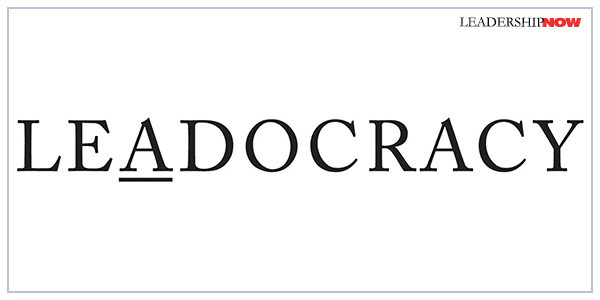
RECENT POLLS reveal that most of us – 88% – think that government is broken. We lack confidence in the people who run for or serve in office. Geoff Smart says we have a who problem. In Leadocracy he writes that the only way to fix the what problems—the deficit, unemployment, and insufficient social services to name a few—is to get the right who into government. Smart finds that there is a huge untapped source of potential leaders in the private sector—if they would just step up. But they don’t—in droves—because of fear. Fear of not being able to make a difference, fear of the financial and psychological costs, and fear of public scrutiny. But they should for three reasons, says Smart. First, a leadership role in government is a new challenge and an opportunity to grow your leadership skills. Second, because you can make a difference, that is enormously satisfying. And third, in government, you interact with an amazing range of people—you build relationships, help them in ways only you can, and become part of a broader community that is making people’s lives better. Smart founded The Leaders Initiative with the goal of having 1500 private sector leaders complete a two-year stint in government (local, state, or federal) by 2030. The hope is that it will have a positive multiplier effect on encouraging more private sector leaders to consider “government leadership” in their career plan. Smart states, “Democracy works best when voters choose great candidates.” It seems like a simple statement, but it explains a lot. He says we are not very good at it. He does offer some tools and tips for determining how qualified a candidate is for the task at hand, and ensuring you are “hiring” the best leader for the job. He hopes we can reverse our tendency to: • place too much emphasis on likeability
I would agree with Smart. However, I would add that government isn’t broken because, in most cases, its leaders lack ideas, are bad people, bad leaders, stupid, incompetent, or just a bunch of amateurs. It’s broken because they are in a system that rewards them for pandering to their constituents. It’s how many of them keep their jobs. It would be a mistake to think that somehow government got all of the bad leaders and the private sector is hoarding them—and if we could flip-flop the situation, the problem would be solved. It’s a systemic problem. We see leaders in government that should know better, giving people what they want not because it is the best option for their constituents but because they want the votes to keep them in office. They effectively stop leading. We do have a who problem. But realistically it is not just a matter of getting the “good people” in. It will take a tremendous amount of fortitude for anyone wishing to serve in government to take the time to educate instead of pander, to do the hard things rather than the expedient, to lead rather than follow, to stand on character instead of popularity. But then, we would probably vote them out. So the issue is something we have to remedy within ourselves too. It’s also an issue the Founding Fathers didn’t think we should take lightly. 
Posted by Michael McKinney at 12:11 AM
06.15.12

What’s Wrong with Leadership Training Today? IT’S A DIFFICULT TIME for leaders. “Our familiarity with and disrespect for our leaders,” writes Harvard professor, Barbara Kellerman in The End of Leadership, “coupled with our feeling entitled and being emboldened, saps their authority, which then drains their power and influence.”
IT’S A DIFFICULT TIME for leaders. “Our familiarity with and disrespect for our leaders,” writes Harvard professor, Barbara Kellerman in The End of Leadership, “coupled with our feeling entitled and being emboldened, saps their authority, which then drains their power and influence.”
Commenting on the 2011 budget-ceiling talks she finds that Barack Obama’s followers are “more disposed to resist him than to support him….No one was able to lead…and no one was willing to follow.” Perhaps no one was able to lead because no one was willing to follow. Leading in America is now more difficult than ever “not only because we have too many bad leaders, but because we have too many bad followers.” Kellerman cites lack of involvement as the culprit, but it goes further than that. We have never been taught how to support a leader in the right way. Followership is as important a skill as leadership. Kellerman notes that the contract—you lead, I’ll follow—between leaders and followers has been undermined “because of the information to which followers now have access, too many leaders are judged by too many followers to be unethical or incompetent or both.” Familiarity with our leaders had bred contempt. Technology has changed the social landscape providing us with so much more information. But it has, I would argue, informed us more broadly, but for the most part, not more deeply—if we even had the time or the inclination to go more deeply. I would also suggest that we are not, at times, very good judges. We lack facts and context much of the time. What frames our judgments are often selfish concerns—just like our leaders. And too, we rarely judge others in the manner that we would like to be judged. The End of Leadership offers a report on the state of leadership and followership today. Kellerman has surveyed the history of leadership to pinpoint a trend—the diminishing power and influence of leaders and people in authority and the increase of power and influence of ordinary people—followers. In recent years, communications technology has played a large part. “The effect on leaders is to diminish them. The more we know about how leaders and managers manage, the more they tend to shrink.” The contract between leader and follower has changed. The assumptions on which it was based has changed because first, “the old justifications for having power, authority, and influence are no longer so persuasive and second because people in the present think of themselves are more important, more entitled than did people in the past.” Kurt Anderson asked in New York magazine, Is Democracy Killing Democracy? He writes: So now we have a country absolutely teeming with irregular passions and artful misrepresentations, whipped up to an unprecedented pitch and volume by the fundamentally new means of 24/7 cable and the hyperdemocratic web. [There is ] the misapprehension that democratic governing is supposed to be the same as democratic discourse, that elected officials are virtuous to the extent that they too default to unbudging, sky-is-falling recalcitrance and refusal. And the elected officials, as never before, are indulging that populist fantasy. Just as the founders feared, American democracy has gotten way too democratic. I wonder if we have—in our radical shift to the entitlement of followers and the bad leadership that encourages it—sowed the seeds for an overcorrection in the other direction. Perhaps we will find ourselves welcoming a society governed by extremely self-deferential leaders to sort it out. History shows us that when societies get to the point that they can’t properly govern themselves, they don’t get more disciplined and make the necessary corrections, they instead get behind anyone that will make all the “bad” go away—usually with negative consequences. Because we have been able to “do” leadership in a way that has been less respectful of the follower and get away with it, doesn’t mean we were doing it right. While old methods of leadership are not tolerated at the present time, it doesn’t mean leadership itself has changed. The “right” way of leading people has never changed; our approach to leading people just swings back and forth from ditch to ditch. History shows us that we rarely get it “right.” Kellerman observes that in the world in which we actually live, “leaders tend to put self-interest ahead of the public interest.” How true. The idea that our leaders reflect who we are should give us pause. Much of the problem with leadership training, in my view, is that we are trying to develop something in leaders long after the train has already left the station. It’s not that it can’t be done. It’ is just much harder. Good leadership development begins much earlier in life. Given our situation, Kellerman asks, how do we learn to lead in the twenty-first century? How to learn to lead when leaders are diminished from what they were, even in the recent past? How to learn to lead when resources such as power, authority, and influence are scarcer than before—and when any number of followers is as likely to be resistant as deferent? And, finally, how to learn to lead when the context itself is fraught with complexity and constraint? Could we develop betters leaders if we developed better followers and would better followers create a pool of better leaders? Should we be training for followership? Should we be teaching the right kind of followership is leadership? The End of Leadership is a vitally important book that every leader/follower should read and consider, but it is the tip of a much larger discussion about leadership, followership and society. Kellerman writes that “it is meant as a caution about the future of leadership in the twenty-first century. For nearly everywhere, leaders are found wanting, followers are restive, and the context is changing—sometimes at warp speed. So unless we get a grip, the prognosis is grim.” Kellerman says that the leadership industry must make at least four changes:
Kellerman lays the foundation with this: “We need to think of leadership as a creative act—for which leaders and followers both are educated, for which leaders and followers both are prepared over a lifetime of learning….There are ways to educate women and men so they learn to be good, smart followers as well as good, smart leaders, and develop as large capacity for contextual intelligence as for emotional intelligence.” Absolutely.

Posted by Michael McKinney at 03:19 PM
04.29.11

Presidential Decision Making: How and Why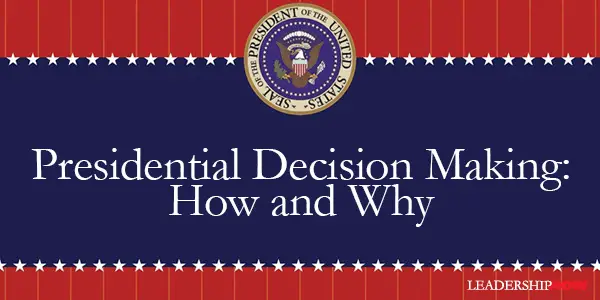
BOB WOODWARD once wrote, "When you see how the President makes political or policy decisions, you see who he is. The essence of the Presidency is decision-making." Nick Ragone has selected 15 presidential decisions that were proactive and ultimately shaped the office and the country. In the process he reveals more of the man.Looking back on decisions made, we often evaluate them based on our biases and current sensibilities. But to truly understand them we must see the world as they saw it. That is what Ragone does in Presidential Leadership. He takes each of these decisions and recreates them from the president’s perspective. It makes for an engaging and thought-provoking read. All of the decisions he selected were controversial at the time and required courage to see them through. The thread that runs through them all is persistence and conviction. Often in these decisions, the president had to make a choice between the good of the Union and his own personal beliefs. While many more decisions are worthy of consideration, he chose to focus on:
In reliving these moments in the pages of this book, you will gain a new appreciation for what it took to bring them about, their consequences and the origins of some of the issues we face today. Some of the decisions made were certainly a product of their time. What president today would deal with a tax revolt by personally leading 13,000 troops around the country in a show of force to intimidate the protesters as Washington did with the Whiskey Rebellion? But it proved to be the right thing to do. There was no bloodshed. “It was a rather anticlimactic ending to what many historians consider the greatest constitutional threat prior to the Civil War. Then there is the colorful account of Andrew Jackson’s handling of the nullification crisis brought on by the Tariff Act of 1832. The Union was at stake. “Jackson,” writes Ragone, “had the perfect skills for the crisis, if not the demeanor. He was ruthlessly consistent with his rationale….He understood the importance of public support and was adept at rousing patriotism through his words and deeds. He wasn’t afraid to be forceful when necessary, yet he tempered his natural impulsiveness because he knew it wouldn’t serve him well. And he had the capacity to grow and learn, something that can’t be said for every holder of the office.” His convictions no doubt guided Lincoln three decades later. Teddy Roosevelt’s approach to building the Panama Canal surely epitomizes the man. About his actions, Roosevelt said, “We would have a number of profound discussions, and they would still be going on now, and the Panama Canal would be in the dim future yet. We would have had a half century of discussion, and perhaps the Panama Canal. I preferred we should have the Panama Canal first and the half century of discussion afterword.” The well narrated history alone makes this a great read, but there are great leadership lessons to be found here as well. Reading through the accounts, it is easier to see how one decision would frame decisions and issues far into the future. Each decision creates a pattern of interaction that then influences thinking and behavior over time. Every decision creates an emergent system. Our decisions matter. What drove Harry Truman to fire Douglas MacArthur at the height of the Korean War? Did Gerald Ford know that his pardon of Richard Nixon could very well end his political career? Why did John F. Kennedy challenge America to reach for the moon? 
Posted by Michael McKinney at 11:28 AM
01.17.11

6 Keys to Becoming SuperCompetentConsidering the pressure on us today, Laura Stack says it’s not enough to be only competent, we need to be super-competent. By that she means that SuperCompetent people “possess a consistent, all-encompassing ability to be good at everything they do, no matter how general or specific.” While that definition may sound super-human (wouldn’t it be nice to be perfect), the thinking behind it is solid and attainable.You have to decide to be good at what you do. Once you have made the decision to do so, SuperCompetent by productivity expert Laura Stack, provides the method. She has isolated six interconnected traits or mindsets that make up the SuperCompetent person: Key 1: Activity. They are driven by intense focus on priorities and have a clear sense of direction. Action: You need to determine what you should be working on. Key 2: Availability. They control their schedules. Action: You need to make time for it. Key 3: Attention. They develop the ability to pay attention to the task at hand. Action: You need to focus on those tasks. Key 4: Accessibility. They are organized and can locate the information they need to support their activities. Action: You need to organize the information you need to complete your tasks. Key 5: Accountability. They are self-disciplined and don’t blame others. Action: You need to be responsible for your results. Key 6: Attitude. They do what needs to be done to make things happen. They are proactive decisive and fast. Action: You never give up. “Each key requires close attention to and a profound understanding of your own strengths, weaknesses, and capabilities in all areas to truly excel.” Stack begins with a short SuperCompetent Assessment to give you an idea of the areas you need to focus on. From there, she provides so much content that even the most competent among us would find something to think about. She provides simple approaches to help you improve in each of the six areas. Some are so simple that you may ask yourself, “Why am I not doing that?” (See the section on accountability.) A friend told her, “Oh, it didn’t bother me. I had a mission, not an agenda.” “So often when launching a new endeavor,” writes Stack, “we get caught up in the agenda of the day—or worse—someone else’s agenda for us. We lose sight of our purpose.” Don’t get distracted by the details. Then there is the problem of the ever-growing To-Do List. She list ten issues at the heart of the problem like: You haven’t made the necessary decisions. Your list should be full of clear, actionable ideas. “If you set a vague goal—like ‘Have a sale’—then you’ve still got a lot of thinking to do before you can hit the ground running and make progress.” If it isn’t actionable, it shouldn’t be on the list. SuperCompetent provides the motivation to rethink your habits and your approach to anything you do; to live and work more responsibly. An sometimes all we need is a little push. Stack writes, “To be consistently successful, you need to be consistently productive.” I find that productivity ultimately comes down to self-discipline. And when you are successful at it, it serves to reinforce the behavior. Better performance promotes our feelings of competence and the enjoyment of our tasks. Productivity equals morale.
Posted by Michael McKinney at 06:18 PM
11.02.10

Political Leadership and Compromise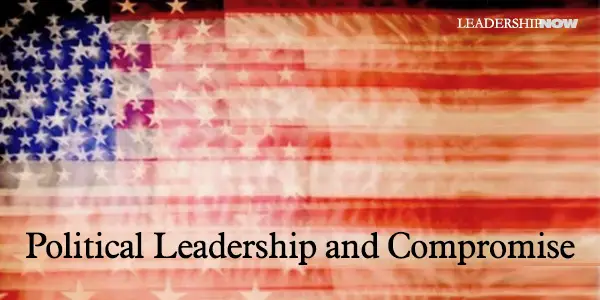
ON ELECTION DAY our minds turn to political leadership. Men and women are elected with the expectation that they will honor commitments they have made to the voters. This often leads politicians to take a short-term view of almost everything. At the same time, plagued by reality, a politician (or any leader for that matter) may find that they have to change direction or offer a compromise. This leads to the “disconnect” we frequently have with political leaders. The problem facing politicians is that reality doesn’t sell. (And of course, we play a hand in that.) So frequently, what gets them into office is not the approach that will get the job done. It is a dilemma all leaders face. It’s a dilemma that requires a certain degree of wisdom. Prudent flexibility, adaptability, and compromise are necessary qualities for leadership. Yet we often hold in high esteem leaders who don’t back down more than those that compromise their position. No one wants to be viewed as weak. But a leader that will not change or even listen to the need for change can cause irreparable damage. It’s easy to get lulled into a sense of our own permanence. We must remember that leadership is temporary. It is a sacred trust that we hold for only a short time. The skill is in understanding what one can be flexible about and what one should not. We should never compromise principles, but approaches (even the proper understanding of how those principles are applied) may need to be adapted. Values and approaches are distinct from universal laws and principles and are derived from them. The former may change; the latter never does. The fact too remains, that we may be wrong, our perceptions might be faulty and our assumptions may be without foundation. When faced with the facts, we need to be able to change direction and chart a new course without losing sight of the ultimate goals. Stefan Stern recently wrote in an excellent post on knowing when to shift your position: “If you are heading full speed ahead for the rocks it is time to change direction….Good leaders adapt to changed circumstances, and admit it when they have made a mistake.” In the introduction to Profiles in Leadership—an excellent collection of essays on leadership—biographer Walter Isaacson shares a historical perspective on compromise: The greatest challenge of leadership is to know when to be flexible and pragmatic, on the one hand, and when it is, instead, a moment to stand firm on principle and clarity of vision. Even the best leaders get this wrong sometimes. I learned this when writing a biography of Franklin. His instinct was to try to balance the conflicting values that were at issue during moments of tough debate and to find common ground. At the Constitutional Convention, he was, at eighty-one, the elder statesman. During that hot summer of 1787, the rivalry between the big and little states almost tore the convention apart over whether the legislative branch should be proportioned by population or with equal votes per state. Finally, Franklin rose to make a motion on behalf of a compromise that would have a House proportioned by population and a Senate with equal votes per state. “When the table is to be made, and the edges of the planks do not fit, the artist takes little from both, and makes a good joint,” he said. “In like manner here, both sides must part with some of their demands.” His point was crucial for understanding the art of true political leadership: Compromisers may not make great heroes, but they do make great democracies. 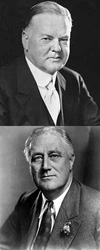 FDR on the other hand was not as well regarded and was mostly known for his connections and family background. “In the end, however,” writes Brinkley, “Herbert Hoover left the white house thoroughly discredited, repudiated, even hated, while Franklin Roosevelt was revered by much of the world when he died in office.” The difference was flexibility. Hoover was “A victim of his convictions, convictions that seemed to him close to absolute….Hoover’s unshakable principles shackled him time and again in his effort to deal with the Depression.” On the other hand, the quality that separated Roosevelt “most decisively from Hoover, was his pragmatic, experimental nature.” The contrast between Hoover and Roosevelt, Brinkley concludes, “suggests that leadership cannot succeed through ideals and strong convictions alone. The world is a complicated and ever-changing place, and a great leader must be capable of adapting to change and understanding the diversity of the ideas and principles that shape history.” Roosevelt was more successful in guiding the United States through the two greatest crises of the twentieth century, “in part because his values were appropriate to his time but also because he understood that values must reflect the realities of his age.” 
Posted by Michael McKinney at 10:21 AM
07.16.10

5 Leadership Lessons: Joseph Nye on Leadership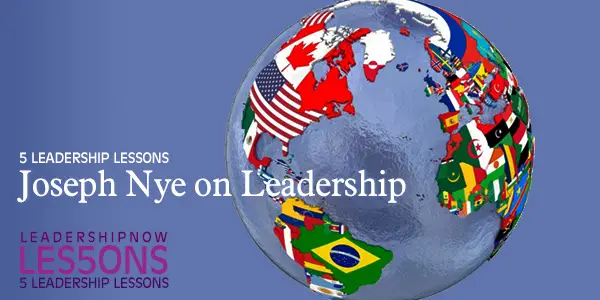
JOSEPH S. NYE is University Distinguished Service Professor at Harvard University's Kennedy School of Government. In The Powers to Lead, he relates leadership and power. He expands further on his concept of soft power—co-opting people rather than coercing them—and hard power—influence involving pressure or threats—but he shows how effective leadership in the real world requires a mixture of both. Hard and soft power are related because they are both aspects of the ability to achieve one’s purpose by affecting the behavior of others. They sometimes reinforce each other and sometimes they interfere with each other. The use of either one or the other depends on context. The ability to know which to use when is what he calls smart power. We need to know our context. He says, “Soft power is not good per se, and it is not always better than hard power. Nobody likes to feel manipulated, even by soft power. Like any form of power, it can be wielded for good or bad purposes, and these often vary with the eye of the beholder.” Here are five leadership lessons from The Powers to Lead:

Posted by Michael McKinney at 06:35 PM
02.26.10

Are Leaders Destined to Disappoint?Historian David Greenberg wrote in the Atlantic, “Americans have fallen, starry-eyed, for leaders who speak of a future unencumbered by history’s weight.” Intellectually we must know that this isn’t possible, yet is it too much to expect real change, fundamental change—a break from the past? It’s unsettling to think that we are only slaves to our past. Are we demanding too much?Greenberg continues, “Theodore Roosevelt’s New Nationalism, Woodrow Wilson’s New Freedom, FDR’s New Deal, JFK’s New Frontier, even George H. W. Bush’s New World Order—all began with the promise of the new. Of course, after the flush of a campaign, both voters and presidents have invariably discovered that history imposes constraints.” And we are left disappointed. Of course, this dynamic affects not only political leaders, but leaders everywhere. One always has to deal with what is (past and present) and the real level of desire (the crisis)—for transformational change to occur. Leadership is a creative act. A leader seeking transformational change needs to have three basic elements in place: clearly defined goals (the how), strong values with which to measure those goals (the why), and an environment that is urgent to change (an opportunity). Expectations create opportunities for leaders. The motivation from which springs the leader’s initiative is most often influenced by certain expectations on the part of the potential followers. Rosalynn Carter once said, “A leader takes people where they want to go. A great leader takes people where they don't necessarily want to go, but ought to be.” This suggests that a leader’s responsibility is to do more than just serve up our wants. As Insead’s dean J. Frank Brown said, “Leaders must learn to listen and question before they act.” We get the wrong kind of leaders when we place all of the responsibility of our expectations on their shoulders. In that environment we will always find individuals that are all too happy to pander to us and promise what they can never deliver in return for a title—placeholder leaders. Leadership is a shared responsibility. A great leader must elevate their followers and give them power and responsibility to act or they can never really lead them. Greenberg writes, “Twenty-five years ago, the political scientist Theodore Lowi published a book called The Personal President He concludes, “It is easy to propose that we lower our expectations for our new presidents—even, or perhaps especially, for presidents who come bearing lofty promises of transformation. But we can’t correct the problem, Lowi’s diagnosis suggested, simply by resolving to demand less from our chief executives or by vowing to learn from the past. The problem is rooted in nothing less than the presidency’s assumption of immense powers, and of a central role in our imagination. Candidates have no better path to victory than by inspiring us with dreams of a new political era, and presidents have no choice but to attempt “too much.” In doing so, however, they can only disappoint us.” Perhaps we aren’t demanding too much of our leaders, we are instead, demanding too little of ourselves. Can we separate ourselves from our “history” and act creatively for real change? Maybe we need a little less heroic leader and a little more heroic follower? It requires leadership at all levels.
Posted by Michael McKinney at 04:16 PM
02.10.10

Leaders Make Connections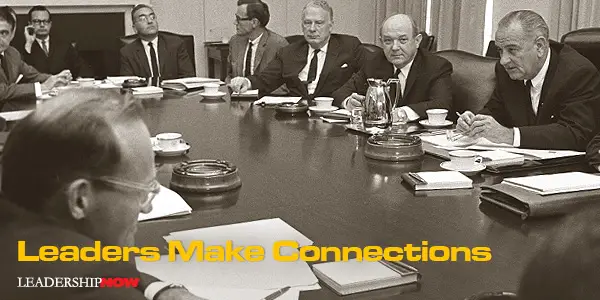
THE Financial Times ran an excellent analysis on February 3rd by Edward Luce concerning the very tight inner circle—just four people—that Mr. Obama relies on for advice. In America: A Fearsome Foursome, Luce advocates a broader circle of advisers and notes, “To be successful, presidents need to separate the stream of advice they get on policy from the stream of advice they get on politics.” Intellectually we know that we need to get their advice and information from a wide variety of sources. In practice, however, it doesn’t always happen. We like to talk to those with whom we are comfortable with and share our views. It’s very reassuring. But dangerous. Dangerous because it clouds our vision and makes us less agile. More importantly, seeking the opinions of others helps to make them feel a part of a larger purpose, connected to the leader and a part of a community. This points to a basic function of leadership: to make connections. 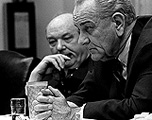 Treasury Secretary Henry Fowler, shrewd, effective, a superb negotiator, but somewhat shy of Lyndon Johnson, would occasionally feel in need of a presidential laying on of hands even when he had no serious presidential business. After one such occasion—it had ended with Fowler, sitting on the edge of the Oval Office loveseat, reading in monotone from his own memo on the floor in front of him, while the president was plucking yellow news tickers from the ticker machine at the opposite end of the Oval—LBJ turned on me, angrily: “What on earth did you bring him in here for, wasting my time ...” and so forth, but then stopped himself mid-sentence. “No, I’m wrong. Make me see him when he asks even if he has no real business! While you staff fellows are safe in the White House, these cabinet fellows are out there every day being shot at, on the Hill, in the papers, on TV. They are my field generals. Never forget that. They’ll be useless to me if they don’t feel connected to me. Always treat them with dignity.” A leader’s position is in the middle; to share and connect. In a world bent on differentiation, leaders must make connections.
Posted by Michael McKinney at 12:00 AM
08.11.09

Ten Lessons on the Meaning of Political Greatness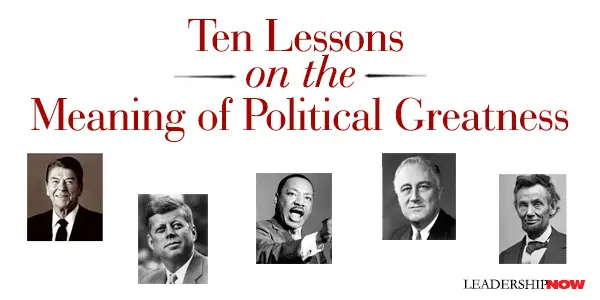
WALTER NEWELL plumbs the depths of history in The Soul of a Leader, “in order to illuminate the recent past, the present, and the challenges to come. Taken together, while they not add up to a recipe for the perfect leader, they at least show how moral, psychological, and intellectual resources we inherit from the traditions of the West, its experiences and its reflections on statecraft from ancient times onward, can give us a compass for the challenges America’s next generations of leaders will inevitably face.”

Posted by Michael McKinney at 03:25 PM
07.14.09

Disconnecting Horizontally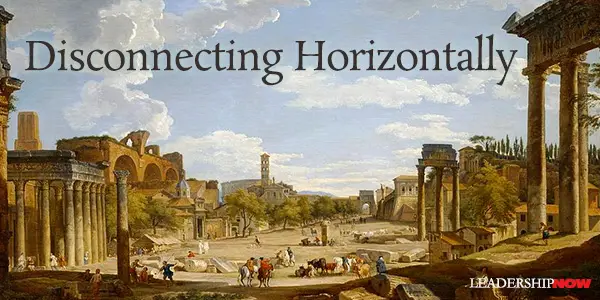
IN HIS excellent analysis of How Rome Fell, historian Adrian Goldsworthy makes some interesting observations about how we tend to disconnect horizontally from anyone or anything outside of our group. We lose our sense of place, and this makes any change so much harder. People resist change when they can't see the bigger picture and why it is necessary. The challenge is to cross our self-imposed boundaries into a world not of our own making and connect to the outside both personally and organizationally.
And this on ever-expanding bureaucracy: By their nature, bureaucracies tend to grow. This was true in the Roman Empire, let alone with the massively larger government agencies of modern countries. Individuals within a department obviously have to focus on a particular task. It is only natural to believe that with more people they could deal with this more effectively. The larger they grow, then the more distant most members will be from the reality of the overall function of the department, and they will become even more removed in their way of thought to anyone outside. This is not inevitably a bad thing, but it does mean that they will continue to expand unless restrained, since their problem or concern is the only one they will see. 
Posted by Michael McKinney at 11:55 PM
02.05.09

Lessons From FDR's Cabinet
With a nod to Albert Einstein, we can't change the system by using the same kind of people we used to create it. Adam Cohen’s has written a very relevant book, Nothing to Fear about Franklin Roosevelt’s first hundred days in 1933. Here is an edited excerpt regarding the Cabinet he selected. It had the distinction of being sworn in at once on the same afternoon after his inauguration. The Cabinet had gotten a lukewarm reception when Roosevelt announced it. Arthur Knock of the Times declared that “its composite trait seems to me to be diligence; brilliance it lacks completely.” The new Cabinet was criticized for lacking “big men.” One Republican congressman wisecracked that Roosevelt had kept his promise to look out for the “forgotten men,” since his Cabinet contained “nine of them and one woman.” Adapted from Nothing to Fear: FDR's Inner Circle and the Hundred Days That Created Modern America by Adam Cohen
Posted by Michael McKinney at 06:17 PM
01.20.09

The Presidential Inauguration: Firsts and FactsSINCE 1901, all Inaugural ceremonies at the U.S. Capitol have been organized by the Joint Congressional Committee on Inaugural Ceremonies (JCCIC). They have provided us with a list of firsts and interesting facts about U.S. Presidential Inaugurations.
Posted by Michael McKinney at 09:06 AM
10.27.08

Weeding Out the Leaders We NeedIn Time magazine this week, Michael Kinsley writes that we don’t just need a good man in the White House this time, we need a great man. He thinks both candidates have the seeds of greatness, but “unfortunately”—and this is what caught my eye—“our current political system seems designed to weed out precisely the qualities that are most needed at the moment.” He suggests that at a time like this we need astringency, not empathy. Feeling our pain won’t get it done. We need leaders willing to tell people what they don’t want to hear. “It's not comforting people about their current situation and reassuring them it will get better. It's telling them that the situation is likely to get worse and that only their efforts can determine how soon it will start getting better. Astringent leadership is Churchill calling on Britons to ‘brace ourselves to our duties.’” But he’s right. Who wants to put that in the White House? We vote for people that tell us that they will fix everything and not bother us. We vote for people that don’t make us take responsibility—who can place the blame somewhere else—who will level the playing field at someone else’s expense—smooth talk over straight talk. History teaches us that this always comes at a cost. It’s problematic for both leaders and followers. Both get their roles wrong and both pay a price. Kinsley writes: We have lucked out several times in our history when implausible characters showed unexpected greatness when it was needed: a country lawyer from Illinois, a spoiled patrician in a wheelchair, to name two obvious examples. Even more miraculous (though troublesome for democracy), both Lincoln and F.D.R. were elected by promising more or less the opposite of what they did in office. Lincoln said he'd preserve the institution of slavery. F.D.R. said he'd balance the federal budget.Can we expect this fortuitous turn of events again?
Posted by Michael McKinney at 10:56 AM
09.28.08

Fixing the Financial Crisis Once and For All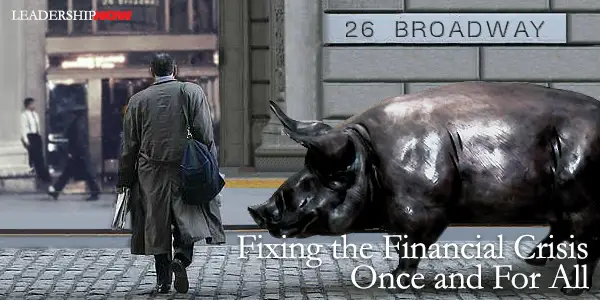
HOPING TO SOUND like leaders, Washington lawmakers want to get to the bottom of this financial crisis and create regulations to keep it from ever happening again. I don’t think it comes as any surprise to anyone that greed—on the part of both borrowers and lenders—is at the bottom of it. You can’t regulate greed out of existence. Regulation just improves creativity. Greed is regulated by character. Character is built at home, in our schools, in our churches, and yes, in our businesses. No one likes to talk about character because it isn’t a quick fix, it often goes against our inclinations, it’s not immediately measurable, you can’t take credit for it, and it’s a time consuming, never-ending process. George Eliot wrote in Middlemarch: “Character is not cut in marble; it is not something solid and unalterable. It is something living and changing.” It’s built-in individuals day by day in little, almost imperceptible ways over the course of a lifetime. The problem is that we have only given a patronizing nod to character and politely moved on with the business at hand. How will I get mine if I don’t play it like everyone else? We learn too late, without character, no one gets anything. 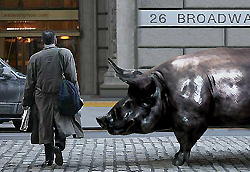 In July, Hugo Dixon opined in the Wall Street Journal, “Greed for higher returns entices investors to take risks; fear causes them to avoid excess. When markets are healthy, the two are finely balanced. Problems emerge when that balance is lost.” You will find character behind this balancing act. Character stabilizes both people and markets. Character is inseparable from the culture in which it is formed. Nothing will fix the financial crisis once and for all, but character will regulate it. Greed is a human issue and it will always be with us. It will always be something we need to train ourselves, our children, and our employees to regulate from within. The consequences can be devastating. Apparently, Mr. Gekko, greed is not good. Lou Mannheim was right, “The main thing about money, Bud, is that it makes you do things you don't want to do.” Or shouldn’t do.
Posted by Michael McKinney at 11:04 AM
04.25.08

Of Chess Players and Banner-Wavers
“It’s a great huge game of chess that’s being played—all over the world—if this is the world at all, you know.” Dimitri K. Simes and Paul J. Saunders explained in The National Interest, why America needs chess players—not banner-wavers. “We have increasingly lost the ability to look squarely in the mirror before judging others and taking them to task.” American leaders have taken their own share of ruthless, and even brutal, decisions….Such decisions, while obviously regrettable, were the result of the types of difficult choices that great powers must often make. But then it behooves us not to preach too loudly about our own sense of morality. It also means that, in crafting an effective foreign policy, we shouldn’t be blinded by our own rhetorical claims to ethical perfection—or to fail to recognize that many states see us as a “normal country”—one that pursues its own interests by any means necessary and often makes moral judgments about others that appear influenced by those interests.
Posted by Michael McKinney at 07:00 PM
06.20.07

Calls for Leadership: The Failed States Index 2007The Fund for Peace and Foreign Policy Magazine has just released the Failed States Index. It is a sobering survey of 177 countries ranked in order of their vulnerability to violent internal conflict and societal deterioration. It is based on 12 social, economic, political, and military indicators. (You can click on the map above to view a larger image detailing the status of various nations of the world, including your own.)The third annual Index found the greatest improvements over the last year in Liberia, Indonesia, Democratic Republic of the Congo and Bosnia. Unfortunately, the risk of failure is running higher than last year in Lebanon, Somalia, Equatorial Guinea, and Niger. Although these countries may seem world's away, their problems have consequences for all of us. Failing States have one thing in common—bad leadership. Foreign Policy concludes, “Many states must endure poverty, corruption, and natural disasters. But, for the weak, there is nothing more costly than a strongman calling the shots.” Billions in foreign aid and security are no match for bad leadership. Effective leadership can reverse a states slide to failure. Three editorials from the last two days, speak to the leadership issue behind these problems. First, here are some comments from The Daily Star in Lebanon titled, “If Lebanon becomes a failed state again, failed leadership will be to blame:” Lebanon's slide downward on the scale toward failure was more pronounced than that of any other country in the world. Who or what is to blame for the fact that Lebanon is once again rapidly on its way to becoming a basket case? Yes, the war with Israel created problems, but the leaders of Lebanon have compounded those "difficulties" and transformed them into an utter disaster. Leaders on both sides of the political divide are guilty of playing solely to their respective supporting audiences and ignoring everyone else. Not one has risen to the challenge of being a leader for all the Lebanese. [There exists a] paralyzing impasse that has been brought on by their political leaders' shared predilections for hubris and maximalism.From AllAfrica Global Media, we have this opinion from Nurudeen Jattau in Nigeria: It is needless to say that the tragedy of the contemporary nation-state of Nigeria is the seeming absence or the lack of visionary leadership in all spheres of governance. This precisely, is the singular reason why analysts are agreed that Nigeria may never reach anything close to its full potential as a nation. All things considered, and whichever way the pendulum swings, we must understand and appreciate the fact that leadership is invariably a means to an end, and not an end in itself.Consider finally, an editorial by Fouad Al-Obaid in the Kuwait Times: If one studies history and the civilizations that preceded us, one will most certainly not come across common names. However leaders on the other hand, do end up in the pages of history for several reasons. They do so when their failure is total and their incompetence is obvious to all. Just as much as they do so when their bravery, their tactics, their leadership capability along with their capacity to move minds and hearts in the most turbulent times is put to test and they succeed.Foreign Policy would agree with Mr. Al-Obaid. They write that effective leadership doesn’t necessarily make a leader popular. “But then, such leadership is exactly what more failing states need: a head of state who chooses continued reforms over his own power and recognition.” I am reminded of something John Lukacs wrote in 1993, “The great and enduring problems are political, not economic. They involve the lust for power, not for money. (But then, this has been true of mankind ever since Adam and Eve, misunderstood by Adam Smith as well as by Karl Marx.)” You don't have to look too hard to find applicable lessons here for any leadership role we find ourselves in.
Posted by Michael McKinney at 08:47 AM
09.20.06

Exemplary LeadershipMichael Dingake wrote this piece on leading by example in Mmegi, Botswana's daily independent newspaper. Here is an excerpt: Any leader who like my clownish primary school teacher who used to say, "Do as I say, not as I do," cannot be a true leader. Leaders must be role models. Any leader who speaks like my teacher forfeits the role model status and is disqualified for leadership ambitions. Leaders who do not inspire emulation can at best be regarded as incompetents, perhaps clowns on the political stage. Exemplariness is a non-negotiable leadership quality.Exemplary leadership or leadership deserving of imitation is what Aristotle would call virtue in action. It's authentic. Not just talking the talk, but putting it into action. Our lives must correspond to the truth which we proclaim. Often times this means transcending our own egos. Leadership isn't something you turn off and on. It's a reality you express.
Posted by Michael McKinney at 12:33 AM
03.27.06

Leadership in Local Government
THE London-based Leadership Centre for Local Government launched an eight-point manifesto for leadership that reveals the challenges that face local authorities today. Stephen Taylor, chief executive of the Leadership Centre, said: “The challenge is as much about governance as it is about government. The manifesto emerged following a series of unique sessions that we held with a number of authorities designed specifically to give leaders and their respective chief executives the qualitative space to critically reflect on their leadership experiences.” A summary of the manifesto's eight points are: 1. “It’s about leadership, not just leaders.” Leaders work within teams which interact with others across the organisation and externally. 2. “Leadership is of the place, not just the organisation.” Local government leadership is about engaging local people to make the area a better place in which to live. 3. “Respect difference.” Leadership work must be in the context of a council’s legacy, challenges and way of being, the manifesto says. 4. “Leading means telling a story.” Leaders need to be engaging and to make sure that people think their ideas are worthwhile. 5. “Leading requires ‘reading’.” Leaders need to be able to read situations and tailor their responses appropriately. 6. “Members and officers travel together.” Executive and corporate management teams need to work together. 7. “Politics matter.” We need to develop politicians as well as managers. 8. “People learn more from experience, not from being told.” Reflection on past experiences is important. You can read more in a 20 page PDF booklet entitled "Living Leadership."
Posted by Michael McKinney at 09:03 AM
|
BUILD YOUR KNOWLEDGE
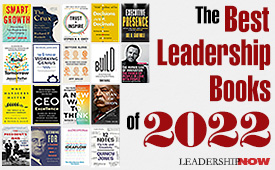

How to Do Your Start-Up Right STRAIGHT TALK FOR START-UPS 
Grow Your Leadership Skills NEW AND UPCOMING LEADERSHIP BOOKS 
Leadership Minute BITE-SIZE CONCEPTS YOU CAN CHEW ON 
Classic Leadership Books BOOKS TO READ BEFORE YOU LEAD |
| ||||||||||||||||||||||||||||||||||||||||||||||||||||||||||||||||||||||||||||||||||||||||||||||||||||||||||||||||||||||||||||||||||||